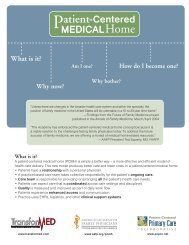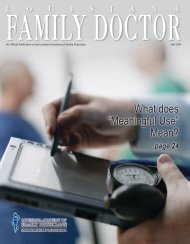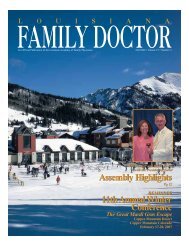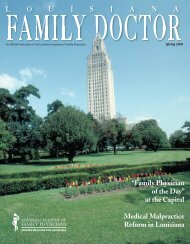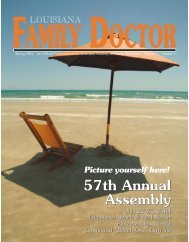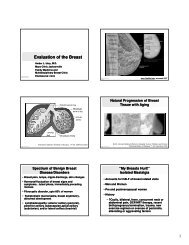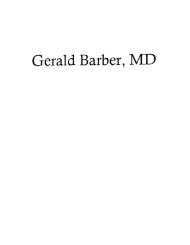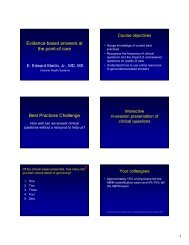New Drug Update 2009-2010 - LAFP
New Drug Update 2009-2010 - LAFP
New Drug Update 2009-2010 - LAFP
Create successful ePaper yourself
Turn your PDF publications into a flip-book with our unique Google optimized e-Paper software.
The FDA’s Reproductive Health Advisory Committee is scheduled to meet on June 18, <strong>2010</strong> to<br />
review the request from Boehringer Ingelheim to approve flibanserin for the treatment of Female<br />
Hypoactive Sexula Desire Disorder or HSDD. Flibanserin (BIMT -17) was originally studied in Europe<br />
for the treatment of depression as it as effects on several of the endogenous neurotransmitters including<br />
reducing serotonin levels while increasing levels of norepinephrine and dopamine. While the trials in<br />
patients with major depressive disorder were not beneficial it did suggest that many women experienced<br />
an unexpected side effect of boosting libido which prompted the company to study this agent for HSDD.<br />
The trials to date have included more than 5,000 premenopausal women ages 18-50 in the US, Canada<br />
and Europe with a diagnosis of HSDD. The 100 mg daily dose increased the number of satisfying sexual<br />
experiences that these women reported from the previous month (a key benchmark that the FDA has set<br />
for approval of agents in this area) from an average of 2.7 up to 4.5, compared to 3.7 among those taking<br />
placebo. The primary adverse effects seen to date have been nausea, dizziness and drowsiness and no<br />
serious complications have been reported to date<br />
Recent findings presented at the 58th Annual Clinical Meeting of the American College of Obstetricians<br />
and Gynecologists in San Francisco, include data from a pre-specified pooled analysis of two pivotal<br />
North American trials (DAISY® and VIOLET®) assessing flibanserin 100mg in pre-menopausal women<br />
suffering from HSDD. The pooled analysis included 1,378 pre-menopausal women with HSDD treated<br />
with either flibanserin 100mg or placebo for 24 weeks. The women evaluated their overall improvement<br />
in "bothersome decreased sexual desire" using the Patient's Global Impression of Improvement (PGI-I),<br />
which is a 7-point scale from 1 (very much improved) through 4 (no change) to 7 (very much worse). By<br />
24 weeks, 48.3 percent of women receiving flibanserin and 30.3 percent of women receiving placebo<br />
reported feeling very much improved, much improved or minimally improved (p




